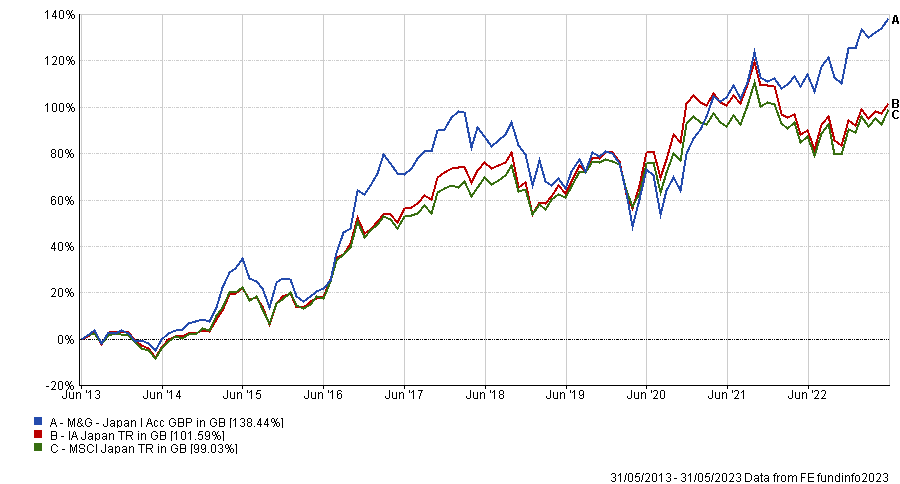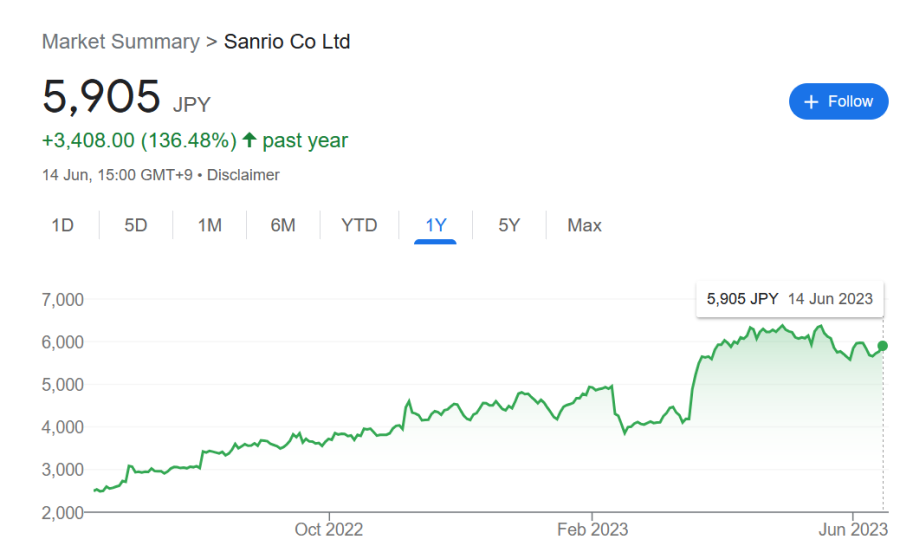Japanese equities are back on the radar after having been out of favour with investors over several decades.
Since the burst of Japanese asset price bubble in the early 1990s, the country has been plagued by a deflationary spiral and periodic negative GDP growth.
Yet, reforms initiated by former prime minister Shinzo Abe to make the Japanese economy competitive again seem to be kicking in, with the Nikkei 225 recently hitting a 33-year high.
In this difficult period for Japanese equities, M&G Japan has been one of the best performing funds in the IA Japan sector, ranking in the first quartile over almost every period.
Performance of the fund vs sector and benchmark over 10 years

Source: FE Analytics
Below, M&G Japan manager Carl Vine tells Trustnet how Japan would benefit from an inflationary environment and why Japanese equities could be on their way back.
Can you explain your investment process?
To really boil it down, we are stock pickers. We're not macro. We're not looking at thematics. We're not top-down. We don't forecast GDP or inflation. We're just agnostic.
We're trying to find very company-specific sources of investment opportunity.
What differentiates you from your peers?
I want to be intellectually honest: I don't have a perfect line of sight to what my competitors are doing. If I had to speculate, I think the landscape in the Japanese equities active management space has been quite polarised into growth and value managers over the last couple of decades.
We're more style agnostic. I'm building a portfolio that is a bit more insulated from the tremendous volatility that you see between different factors. We're trying to actually avoid that. What we're trying to do is to build a portfolio where the excess return and the risk in that portfolio is driven by the stock picking component.
What are the specificities of the Japanese stock market?
It's big and pretty liquid in a global context, but it's poorly covered compared to other major developed markets. That's something quite specific to Japan that is relevant for prospective investors in an active equity mandate. There are plenty of stocks that are undiscovered.
The other thing that's quite specific to Japan, from my perspective, is where Japanese corporates are at in their in their development cycle. It might sound crazy to say this, but if you look back into the post Second World War period, Japanese businesses weren't really created as profit generating entities. They were created to be organs of the government’s industrial policies.
It was only following ascension of Shinzo Abe in 2012 that the social contract started to change. He effectively said that the corporate sector was going to allocate resources by using the profit motive. So, you have this this incredible situation in Japan where businesses are rapidly changing their behaviour from government policy optimising machines to businesses that are trying to compete on a global scale.
Why should investors care about that history lesson? They should care because it means that it's plausible that Japanese stock market’s earnings will grow at 10% compound for the next decade.
The Nikkei 225 recently hit a 33-year high. What do you make of it?
I think the market is gradually becoming aware of the opportunity set in Japan and the market is going up as a consequence. Why is it paying attention? One might plausibly speculate that the change in the Bank of Japan’s policy in mid-December, which was a very minor adjustment, somehow signalled to the world that Japan's 25 years of deflation might be coming to an end.
If there's any stock market on the planet that needs some inflation, it's the Japanese one. Trying to generate profit growth in a deflationary environment is very hard for any company in any economy. The Japanese market might, in fact, be a beneficiary of a little bit of inflation.
I also think that ongoing evidence of this corporate reform and the impact it's having on earnings continues to gain traction and awareness globally.
What are the headwinds and tailwinds for the Japanese market?
The obvious headwind is the demographics. They've got a rapidly ageing population. It is not unique to Japan, but they are at the tougher end of the spectrum. How can you get 10% compound earnings growth from a stock market in an economy that's got structural growth problems? I have no clever answer for that.
The flip side of that is that long term growth is a function of productivity and population and it’s the productivity point that is interesting to me. This government-led campaign to use the profit motive as a better way to allocate resources and drive growth and innovation has really moved the needle in terms of that productivity point.
If you look at the global rankings of labour productivity, Japan is below the 30th rank. It's a very industrious nation, so how do we square the circle of that? I would speculate that a large part of it is due to an overly fragmented corporate sector. There are a lot of small businesses in Japan. There's nothing bad about that per se but what it means is that you have a lot of duplicated costs throughout the economic system. There are a lot of overhead costs, with a lot of people doing the same thing in different buildings.
Prime minister Kishida said that the corporate sector needs to consolidate in Japan. Let's just play a thought experiment: if the Japanese labour productivity tomorrow was the same as the US, GDP would be around 40% higher. I think a tailwind is going to be productivity.
What have been your best and worst calls over the past 12 months?
We've been blessed in the last 12 months. We have had a lot of stocks that have done really well for us.
One of those names is Sanrio, which is the owner of the character Hello Kitty as well as many others. It is a stock that we've covered for more than a decade. In the last couple of years, that stock is up about 400% from where we first bought it. That's been a bit of a homerun for us, frankly.
Performance of stock over 1yr

Source: Google Finance
As for the worst call, I cannot give any name because it's a bit sensitive, but it's about opportunity losses. We haven't anything that has blown up per se, but there are a couple of stocks where we've divested and they went on to do well afterwards. The process of that decision-making was robust, but in the end, they were poorly timed divestment decisions.
You also manage another fund (M&G Japanese Smaller Companies). How do you split your time between the two funds?
We have an investment universe with hundreds of stocks that the team has been diligently tracking for a very long period of time. Some of them are large-caps and some of them are small-caps.
Over the years, when you diligence large-cap businesses, you often go and speak to smaller businesses, suppliers or customers to try and diligence at various points of the value chain. As you can imagine over 25 years, you end up building up quite a lot of knowledge about those smaller businesses.
As I mentioned earlier, the Japanese corporate sector is quite fragmented. What we find when we're looking at economic clusters or sectors, there's normally five or six smaller-cap proxies for larger businesses.
There's a tremendous amount of synergy between our small-cap and our large-cap strategy. So, it would not be true to say I spend X percent of my time on small-caps and X on large-caps.
How did you get into Japanese equities?
When I was at Oxford University, I studied Japanese politics for a little bit of time at the Nissan Institute and became fascinated by Japanese politics and economics.
When I got my first job in the City, the first thing I was asked to do is to write an investment memo on the impacts of the big bang financial deregulation in the financial sector of Japan in the late 90s. It almost happened organically. I had an interest in Japan and then my first project purely by coincidence happened to be related to Japan. That's how it went from there.
I also got exposed to some great Japanese investors early on in my career and always found enough interest to stay focused on that market. I moved to Tokyo in 1999 and lived there for five years. I was in Hong Kong for 10 years after that. From the very beginning, my career has been focused on Japan and Asia.
What do you do outside of fund management?
I read a lot. I don't read any fiction, which is shameful. I really should, but I just love learning about science, technology, healthcare or biotech.
I have got three kids and an amazing wife. I try to be a good parent, good son and good friend.
I just try to optimise my life in general.





